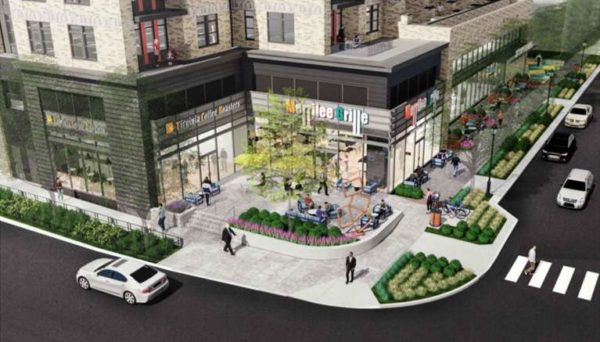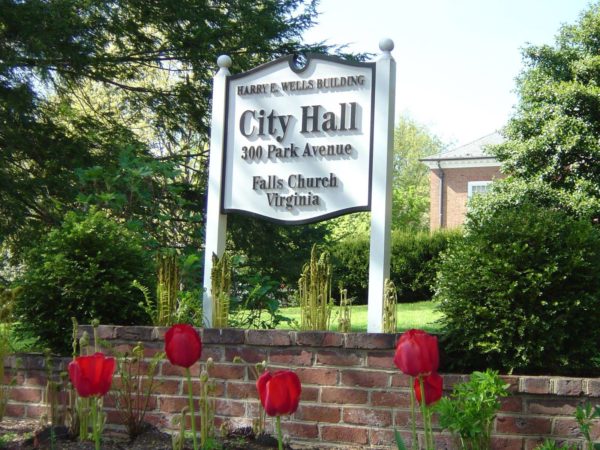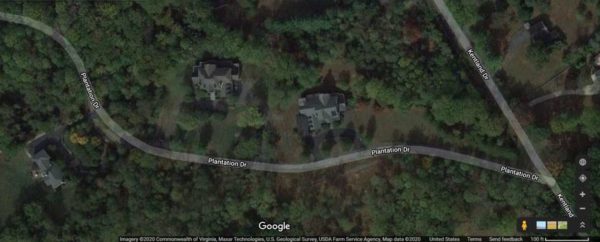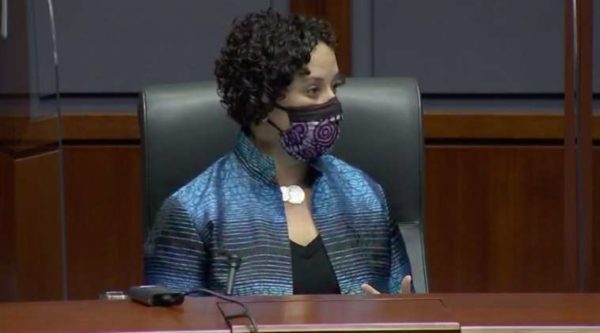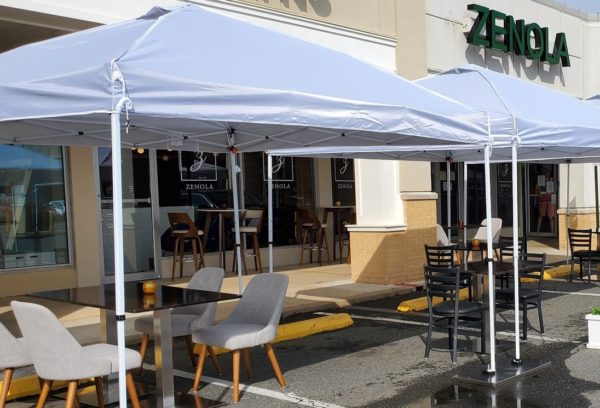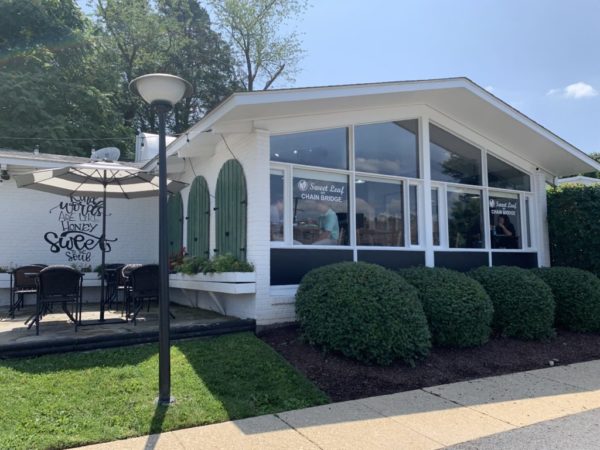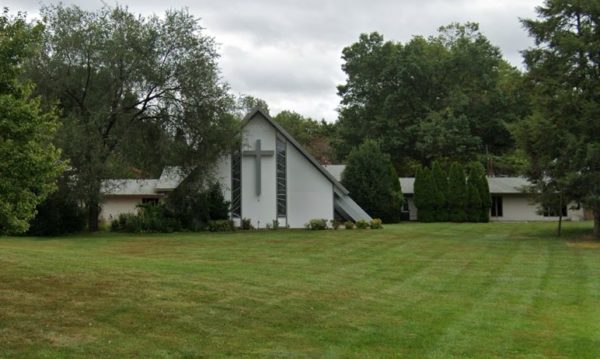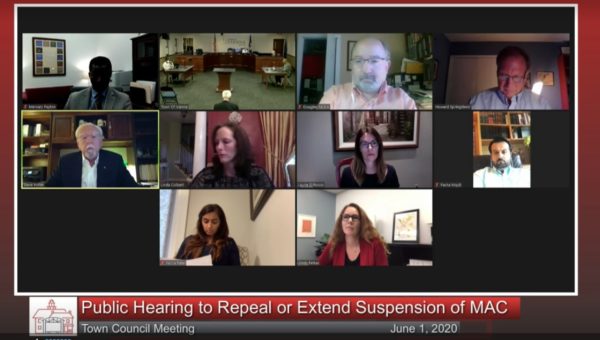The mixed-use development that Elm Street Development has envisioned for the Dunn Loring Center remains on track for realization.
In a report released on Nov. 18, Fairfax County staff recommends that the county planning commission approve the developer’s application to rezone the two-acre site at 2722 Merrilee Drive for planned residential mixed-use zoning.
Located less than half a mile from the Dunn Loring-Merrifield Metro station, 2722 Merrilee Drive is currently occupied by a three-story office building that was originally constructed in 1984. The site is zoned for an I-4 medium intensity industrial district.
Under the name Merrilee Ventures L.C., Elm Street Development first submitted a proposal for turning Dunn Loring Center into a mixed-use development to Fairfax County on Dec. 9. The application was accepted on Mar. 5.
The developer proposes transforming the existing office building into a seven-story, 85-foot building with 239 multifamily residential units across five floors.
The bottom two floors will consist of an above-grade parking structure with 294 parking spaces – 264 for residential use and 30 for retail use – as well as two loading spaces, a trash enclosure, and a bike storage room, according to the Fairfax County staff report.
Amenities proposed for the development include an expanded streetscape along Merrilee Drive, a retail plaza adjacent to the nearby mixed-use apartment building Halstead Square, public open and park spaces, a dog park for residents in the building’s northwest corner, and other private indoor and outdoor spaces for residents, such as a pool, grilling stations, and a fitness center.
The project will occupy 235,235 square feet total with a floor area ratio of 2.70.
“The proposed development would contribute to the revitalization and development of the Merrifield Suburban Center and Transit Station Area through the provision of high-quality design and pedestrian facilities that are appropriate to the ‘Main Street’ designation of Merrilee Drive,” county planning staff say in their report.
In addition to seeking to rezone the site, Elm Street has asked Fairfax County to approve the proposed reduction of 18% of the property’s existing parking.
“Fewer parking spaces than would be required in the Fairfax County Zoning Ordinance will be necessary to accommodate future on-site parking demand because of the site’s proximity to the Dunn Loring-Merrifield Metro Station,” the engineering consultant Gorove Slade says in a parking reduction study prepared on May 19. “A parking reduction would not adversely affect the surrounding areas.”
Elm Street says on-street parking will be provided on Merrilee Drive and on a proposed private street that could eventually be extended to connect Merrilee with Dorr Avenue to the west.
Fairfax County staff say the planning commission should approve the parking reduction request “based on the proximity of the development to mass transit facilities.”
According to the report, Elm Street has committed to making 16.6% of the residential units in the new development workforce dwelling units. A third of those units will be priced at 80% of the Washington, D.C., metropolitan area’s area median income, a third will be at the AMI, and the last third will be at 120% of the AMI.
Since the existing property has few existing trees, the developer has proposed adding about 8,962 square feet of tree canopy coverage, which Fairfax County staff says would exceed the county’s comprehensive plan requirements.
In another proffer, Elm Street has said it will contribute $12,262 to Fairfax County for each of the 27 new students that the Dunn Loring Center development is expected to add to the public school system. Children who live in the development will attend Shrevewood Elementary, Kilmer Middle, and Marshall High Schools.
The full staff report for the Merrilee proposal can be found through Fairfax County’s land development system.
A Fairfax County Planning Commission public hearing on the Merrilee application has been set for 7:30 p.m. on Dec. 2, and the Fairfax County Board of Supervisors will hold a hearing on Jan. 26, 2021 at 3:30 p.m.
Photo courtesy Elm Street Development
The City of Falls Church wants to expand its stock of affordable housing, but exactly how it should achieve that remains up for debate.
One option currently under consideration is updating the zoning ordinance’s special exception section, which has become a reliable tool for encouraging mixed-use development.
Under a preliminary proposal presented to the Falls Church City Council on Monday (Nov. 16), the criteria for evaluating possible development projects would be amended to incentivize the inclusion of affordable housing units, allow for smaller structures, and better reflect the current state of the commercial real estate market.
“With the economy changing and obviously the future of work and commercial space probably looking pretty different, I do think it’s time for us to modernize this,” City Councilmember Letti Hardy said. “…I know this is something that’s really important to the city and not something we want to take lightly.”
The special exception provisions in Falls Church’s zoning code permit mixed-use development and taller building heights than what is otherwise allowed in underdeveloped commercial areas that the city identified as sites that could be revitalized in its 2005 Comprehensive Plan.
The so-called Planning Opportunity Areas, including downtown Falls Church and West Broad Street, were officially designated as revitalization districts in 2016.
To qualify for consideration under the special exception provision, development proposals must be consistent with the city’s comprehensive plan, show a significant net increase in the site’s new commercial square footage, and generate positive net new commercial and residential revenue.
Developers can get an exemption from the latter two criteria if at least 75% of the residential units in their project qualify as affordable housing.
The special exception provision has facilitated the completion of 10 mixed-use projects in Falls Church since 2003, all but one of which have brought in revenue for the city. Four more are now in the works, including Founders Row, the West Falls Church redevelopment, and the Broad and Washington project.
However, there have also been projects that fell through because they were unable to meet the code’s criteria without adding height and density that drew objections from surrounding neighborhoods.
Falls Church Planning Director Paul Stoddard says a proposed development at Tradition Place collapsed in 2016 after the developer started making the building taller to compensate for the net commercial square footage requirements and concessions to the city that were under discussion.
A Park & Lee development application submitted in 2017 failed to obtain approval after facing similar obstacles.
“Because there was some existing commercial [area] on the property, they were not able to meet that net increase in commercial in order to get through without making the project more dense, which was an issue for the community surrounding it,” Falls Church City Senior Planner Shaina Schaffer said.
In addition, none of the special exception projects approved by the city have met the threshold of 75% affordable housing needed to forgo the requirement for adding commercial space, which is less in demand now, especially for traditional office and retail uses.
To address these issues, the Falls Church planning staff is recommending that the city council amend the zoning ordinance so that projects only have to provide new commercial space, rather than adding to the existing square footage. They also say the 75% affordable housing threshold should be reviewed to see if it should be lowered to be more feasible.
Councilmember Debora Hiscott suggested that city staff should reach out to contacts in the developer community to get a sense of what percentage of affordable housing would be palatable for them.
“If we want to know what will bring [affordable housing] in, I think who better to ask than the people who’d be bringing it in?” Hiscott said. “Then we can make decisions from there whether it’s palatable for our community, whether it meets our goals, and brings in that revenue.”
Photo via City of Falls Church Government/Facebook
While one battle continues in the courtroom, a new front has opened up in the McLean area’s protracted war against Newport Academy, a for-profit rehabilitation program for teenagers and their families.
Newport Academy recently leased two properties on Plantation Drive in Great Falls that it plans to turn into residential facilities for teens with depression, anxiety, trauma, and other mental health issues, according to a letter from the company’s legal representatives to Fairfax County Zoning Administrator Leslie Johnson.
Sent on Oct. 8, the letter asks Fairfax County to affirm that the proposed use would constitute a group residential facility and, therefore, would be a by-right use, meaning it would not need to go through the county’s zoning approval process.
“The physical characteristics of the Property are ideal for such a group home,” the letter says, highlighting the property’s distance from adjacent sites, one of which has no residents. “The Property also boasts beautiful outdoor space, including both a covered and uncovered deck, and significant grounds.”
In the letter, McGuireWoods attorney Sean Murphy and Relman Colfax partner Michael Allen state that the property in question – a 10,390 square-foot home located at 11740 Plantation Drive – “contains ample space for parking,” including a garage and circular driveway, and “presents no problems for parking or local traffic.”
The law firm also sent a separate request for a use determination on the property at 11901 Plantation Drive, which would be used for the same purpose.
Newport Academy’s potential new neighbors disagree with its characterization of the two properties.
The residents who own the six other properties on Plantation Drive, which is just north of Route 7, wrote their own letter to Johnson on Nov. 3 asking the county’s zoning administration division to deny Newport Academy’s requests.
The residents argue that Newport Academy’s proposal would violate the Fairfax County Zoning Ordinance because its patients could count as transient occupants instead of residents, and because it would exceed the eight-person limit for group homes if the two leased properties are combined into a single facility.
The residents also say Plantation Drive is an “inappropriate” location for Newport Academy’s proposed facility, which would have adverse impacts on traffic and pedestrian safety.
“The proposed use presents substantial and untenable risks of harm from significant additional traffic, including large trucks, on the single lane driveway,” the residents stated. “This driveway is used by pedestrians, including children walking to and from their bus stop. There have been numerous incidents involving vehicles on the driveway in recent years.”
Newport Academy previously attracted residents’ ire when it sought to open two rehabilitation facilities along Davidson Road and on Kurtz Road in McLean.
Johnson determined in May 2019 that, since it would consist of three adjacent properties, the proposed Davidson Road facility would constitute a congregate living facility, which is not a by-right use.
Johnson found that the Kurtz Road site, on the other hand, would qualify as a group residential facility. The county board of zoning appeals ultimately upheld her decision on Mar. 11, leading residents from the surrounding neighborhood to file a lawsuit that is still waiting to be heard in Fairfax County Circuit Court.
“Due to the ongoing legal process regarding our home on Kurtz Road, we cannot comment on the matter,” Newport Healthcare Senior Director of Communications Kristen Hayes said when asked about the lawsuit.
Newport Academy has been operating a residential treatment program for adolescent girls at 1318 Kurtz Road in McLean since Mar. 22.
Plantation Drive resident Norman Chirite believes similarities to the situation with Davidson Road suggest that he and his neighbors have sufficient grounds to oppose Newport Academy’s request.
He will present their case to the Great Falls Citizens Association during its land use and zoning committee meeting tonight (Tuesday).
“I think what they’re doing is pretty problematic,” Chirite said. “It’s like they didn’t get what they wanted in McLean so they just moved down the road, and you know, we’re going to fight back a little bit.”
Unlike the Davidson Road properties, though, the houses on Plantation Drive have already been used as group residential facilities. They previously belonged to Sagebrush Treatment Center, which operated treatment programs for adult men recovering from substance abuse.
Newport Academy says that its plans for the property will be less intensive than how it has been used for the past three years.
The company says that the services it plans to provide through the facilities on Plantation Drive will be “a key resource,” especially as the COVID-19 pandemic exacerbates mental health issues for many people.
“Many teens lack access to quality treatment for mental health issues like depression, anxiety, and trauma, or face long waiting lists for programs,” Hayes said. “…We look forward to expanding in this area to provide these much-needed mental health treatment services for teens.”
Photo via Google Maps
How often should a homeowner have to reassure the county that their granny flat is a granny flat?
That is one of many questions facing Fairfax County as it continues working toward the first major overhaul of its zoning ordinance in 40 years.
Providence District Planning Commissioner Phil Niedzielski-Eichner attempted to answer some of those questions in a discussion with the Providence District Council on Oct. 14 that also touched on development and housing.
The importance of the Fairfax County Zoning Ordinance Modernization Project, or zMOD, has become increasingly apparent as housing affordability challenges persist and more people work from home during the COVID-19 pandemic, Niedzielski-Eichner says.
“We want, on the one hand, to increase the opportunity for people to afford to live in the community,” Niedzielski-Eichner said. “We want to allow for the potential of people working out of their homes. We want to recognize that that’s an evolving reality. At the same time, we’re sensitive to protecting the neighborhood and don’t want it to cause parking problems and other neighborhood issues.”
Among the biggest proposed changes to the Fairfax County Zoning Ordinance are new regulations for accessory living units, which generally known as accessory dwelling units but got a name change in Fairfax to avoid confusion with affordable dwelling units.
Defined as “subordinate living spaces with areas for eating, sleeping, living, and sanitation,” ALUs are currently only allowed in Fairfax County if an occupant of the unit or the principal dwelling is 55-plus years old or has a disability.
Under Fairfax County’s most recent draft zoning ordinance, which has been available for public comment since June 30, the Fairfax County Board of Supervisors would have the option of eliminating the age and disability requirements for an accessory living unit.
The draft ordinance also outlines a new process for homeowners to get approval for an ALU.
Currently, homeowners currently have to attend a public hearing if they want to add an ALU, but the proposed zoning ordinance allows property owners to instead apply for an administrative or special permit that would need to be renewed every five years.
Niedzielski-Eichner says county staff is considering requiring renewal every two years instead of five, as they try to acknowledge concerns about the potential impact of accessory living units on neighborhoods without overly burdening property owners.
“We already know that people are doing accessory living units outside of the context of permitting or any regulation,” the Providence District planning commissioner said. “If we make it so difficult that people don’t want to enter into the process, then we lose the ability to influence the quality of that process and how it’s implemented.”
The Fairfax County Planning Commission’s land use process review committee is scheduled to have a discussion on zMOD this Thursday (Oct. 22) at 7:30 p.m.
Other land use and zoning challenges facing Fairfax County, especially a district like Providence that spans urbanizing centers like Tysons and older neighborhoods like Mantua, include expanding the availability of affordable and workforce housing, and ensuring that county services and infrastructure keep pace with development.
Niedzielski-Eichner says he has advocated for the county to become more data-driven when making decisions, such as altering policies around ALUs, that could potentially change the character of a neighborhood.
“It’s all about community confidence,” Niedzielski-Eichner said. “I feel that we have to do those things so that the community will come along with the policy and have confidence that it follows their best interests.”
Image via Providence District Council
Fairfax County is in the process of overhauling the outdated sections of its zoning ordinance, and Supervisor Dalia Palchik will be on hand tonight to address any questions locals might have about some of the upcoming zoning changes.
The Zoom meeting is scheduled tonight (Wednesday) at 7 p.m. and is open to all residents of the Providence District.
“Join the Providence District Council in attending this virtual community outreach meeting hosted by District Supervisor Dalia Palchik to learn from Planning and Development staff, ask questions and provide feedback on the zMOD Consolidated Draft,” the Providence District Council said in an email.
A 711 page draft document contains all of the planned changes. Many are modernizations that bring Fairfax’s zoning language in line with state and federal regulations to reduce confusion, such as renaming “home childcare facility” to “home daycare facility” and adding new classifications of residential uses, like accessory living units.
Questions can be submitted in advance via email to [email protected].
Image via Fairfax County
Restaurants and businesses in the Town of Vienna can take advantage of outside spaces for the next seven months.
Last night, the Vienna Town Council voted to extend a temporary waiver on commercial activity outside in hopes of helping local businesses stay open during the coronavirus pandemic.
Businesses are utilizing parking lots and sidewalks in hopes of attracting more customers as they operate under state and local rules capacity restrictions and social distancing guidelines. As the pandemic continues, customers are gauging how safe they feel inside or outside — with some people opting to limit their time inside businesses.
“We have got to do this to keep our businesses going,” Councilmember Howard Springsteen said.
The Vienna Town Council first approved the emergency ordinance on June 1 and then readopted it on June 15. Before the town officials voted last night, the temporary waiver was set to last until Sept. 30.
Now, town businesses will have until March 31, 2021 to apply for and use temporary emergency outdoor commercial activity permits, which Town Manager Mercury Payton authorizes. Payton can also waive regulations for signage and conditional use permits for outdoor dining activities.
After Councilmember Nisha Patel pushed the town to consider a similar waiver for non-commercial zones, Colbert suggested calling for an emergency session on Friday for the Vienna Town Council to consider the proposal.
Patel said that she knows of private schools that would like to use outdoor space for teaching. “If you can get the kids out of the classroom and out into the open air, I think is safer in general,” Patel said.
Photo via Vienna Business Association/Facebook
The coronavirus pandemic is posing new challenges to a McLean restaurant’s years-long efforts to add two more parking spaces to meet Fairfax County regulations.
Before the pandemic, Sweet Leaf Cafe and its landlord, Juliano Properties, were working to submit the required parking information to county staff earlier this year, Juliano’s attorney told the Fairfax County Board of Zoning Appeals today.
Sweet Leaf (1359 Old Chain Bridge Road) temporarily closed after Gov. Ralph Northam ordered restaurants to close their seating and issued a stay-at-home order in March, and now the restaurant and landlord face financial challenges, the attorney said.
The Board of Zoning Appeals again delayed the restaurant’s and landlord’s appeals of the zoning violation after county staff said that the pandemic is putting a financial strain on the restaurant.
Most of the discussion today about the appeal rehashed the nearly five-year-long effort to resolve the restaurant’s zoning violations.
In late 2015, the restaurant got hit with zoning violations following a complaint about a lack of parking. A zoning ordinance update a few years ago addressed one of the violations, but still leaves the restaurant non-compliant with the parking requirement, which is based on the building’s square footage. Currently, the restaurant has 12 of the 14 required parking spaces.
Sweet Leaf’s Co-Founder Andre Matini told the zoning board in March that finding the additional two parking spaces has been challenging.
Now, the new financial hurdles are also impacting the situation.
“We have not been able to front that cost,” the attorney said today about the engineering firm Juliano hired to assess the parking situation. “We need time for the resources to be mustered.”
St. Clair Williams, a county staffer, said that once the engineering firm submits information, the rest of the process should be “fairly smooth.”
The zoning board, Dranesville District Supervisor John Foust and county staff have said they don’t want to force the restaurant to close. At the same time, county officials have expressed frustration this year about how long the compliance process is taking.
“I think 15 [delays] in four years on one case — something isn’t working,” James Hart, a zoning board member, said today.
The zoning board unanimously voted to delay consideration of the appeals to Nov. 4.
While Sweet Leaf did not have a representative at the meeting today, the landlord’s attorney and Williams assured the zoning board that the restaurant will be OK with the delay to November.
After delays due to the pandemic, the Fairfax County Board of Zoning Appeals approved changes that will allow a McLean church to expand its child care offerings.
The St. Thomas Episcopal Church (8991 Brook Road) wants to add a child care center that will be open from 6 a.m.-6 p.m. on weekdays along with the current nursery school. The church would like to have up to 99 kids on-site at any one time.
“What we’re trying to do is modify the conditions to bring a nursery school that was approved almost 25 years ago to modern standards and to meet the expectations of what families are looking for in 2020 for child care,” a representative for the church said.
Currently, the zoning ordinance limits the church to having its nursery school divided into morning and afternoon sessions with 50 kids max per session and hours from 8 a.m.-3 pm.
The church representative said that there is barely any need for a mid-day drop-off, saying that parents need all-day daycare.
More from the staff report:
The proposed child care center will operate within the same building as the existing nursery school, and no exterior renovations are proposed as part of this application… In a nursery school, children aged 2-5 years old are limited to four hours of care per day, while children 5+ years old are limited to six and one-half hours of care per day. In a child care center, there are no time limits on the number of hours of care per day.
The nursery school/child care center will continue to have a maximum enrollment of up to 99 students at any one time. The children will be aged from 2 years through 5 years… The applicant indicates that the nursery school/child care center facility will serve both parishioners and residents of the surrounding community. The facility will have 10-15 staff members…
Staff with the Fairfax County Department of Transportation (FCDOT) raised concerns with the impact that additional vehicles would have on the afternoon peak hours of operation at the intersection of Lewinsville Road / Brook Road / Leesburg Pike…
Staff with the Virginia Department of Transportation (VDOT) estimates the intersection improvements will be completed by the end of 2022, with the construction of sound walls, streetscape, and lighting continuing to 2024… [The] applicant has agreed to, a development condition restricting the number of students to 50, for either three (3) years or until the intersection reconfiguration is complete — whichever occurs first.
The BZA was originally going to consider the changes in May, but the application was delayed due to the coronavirus pandemic, according to the agenda.
The church has undergone three expansions, according to county documents. If the church proceeds with a fourth construction phase, the church would be able to offer up to 325 seats in the main area of worship and the parking spaces would increase from 70 to 90, county staff said.
“The final Phase 4, which includes a significant expansion of the main sanctuary, has not yet occurred. The Church has indicated that while they have no immediate plans to construct Phase 4, they wish to maintain their right to do so in the future and propose no changes to the previously approved layout as part of this amendment,” according to county documents.
The church currently has a fenced, 25,000-square-foot playground.
On Wednesday, the zoning board approved the proposed changes to allow for the child care center.
Image via Google Maps
The Fairfax County Board of Supervisors is looking to alter its rules for adult day care centers after providers complained about previous zoning changes.
The board will vote on Tuesday to authorize public hearings — one for the Planning Commission on Sept. 16 and one with the county board on Oct. 6.
The newly proposed changes would make adult day care centers a by-right use in industrial areas and allow the Health Care Advisory Board to review proposed centers. The county also wants to reevaluate the requirement for outdoor recreation space at the centers.
Back in 2018, county officials greenlighted zoning changes that adult day care center providers now say have made it difficult to find appropriate locations in the county, according to county documents.
More from the county documents:
Of particular concern is the requirement for special exception approval in the industrial districts and the requirement to provide outdoor recreation space. This use, similar to child care centers, private schools and places of worship, was previously allowed by-right when located in an office or industrial park and where vehicle access is provided via the internal circulation system of the park. Adult day care providers indicated that the special exception requirement puts them at a disadvantage when trying to lease space, particularly industrial flex space, as other uses with similar land use impacts are allowed by-right, like child care centers, private schools, and places of worship.
The new proposal under consideration stemmed from county officials earlier this year asking staff to review the regulations.
The hearings will seek feedback from community members on the proposed amendments.
After years of pausing the Maple Avenue Commercial (MAC) zone in attempts to revamp it, the Vienna Town Council decided last night to repeal the zoning code and “start fresh.”
The Vienna Town Council held a public hearing last night on the two options for the MAC’s future: either repealing it or extending the moratorium, which has been in place since 2018, on the zoning code to June 2022.
To Repeal or Not to Repeal?
The two choices received a mixed reaction during the public hearing. Supporters for extending the MAC generally side that the zoning code has many good aspects that they don’t want to see completely scrapped, while supporters for repealing argued that town staff and consultants the town wants to hire need a clean slate.
Mary McCullough, who recently left the town’s Planning Commission, urged the Town Council to keep suspending the MAC until the code rewrite is done. “Repeal says we harmed,” she said. “That’s the message you send with repeal.”
Vienna resident Roy Baldwin said that repealing the MAC sends the message that the work from volunteers on the zoning code “is of no value.” Resident Ray Brill Jr. disagreed, saying that people’s hard work on the MAC is not enough of a reason to keep it.
“The fact that we repeal does not mean we don’t incorporate the vision and some of the things we like,” Brill added.
Cindy Petkac with the town’s planning and zoning division told the Town Council said she thought they would be “better off starting fresh.”
“I think it would be more efficient to repeal it,” Petkac said. “It is a cumbersome, confusing process in my professional opinion.”
Consultant Challenges
The town’s plans to hire a consulting firm to help with rewriting the code also factored into the conversation last night about what to do with the MAC.
The Vienna Town Council initially paused its plans to hire a firm for $250,000 due to the COVID-19 pandemic.
Baldwin, the local resident, testified that he isn’t convinced the town needs to spend money on consultants when locals with expertise “will work for free.”
Council Douglas Noble argued that bringing in a consultant is even more important now to help the town heal from the pandemic. The Town Council will consider hiring the consulting firm on June 15, Mayor Laurie DiRocco said.
Close Vote
After the public hearing and some discussion among the councilmembers about the MAC, Noble proposed a motion to repeal it.
“It’s not about the MAC,” Noble said. “It’s about how do we make Make Avenue commercially economically viable?”
To quell some concerns about ditching the good parts of the MAC, Councilmember and Mayor-elect Linda Colbert offered an amendment that would make reports, studies, surveys, comments from the Planning Commission and Board of Architectural Review and more a part of the package of information the consultants would review.
A lively discussion continued on the idea to repeal, and Noble suggested withdrawing his motion, saying that he thought the councilmembers wanted to talk more.
Ultimately, the council approved Colbert’s amendment and then voted for Noble’s motion 4-3, with Noble, DiRocco and Councilmember Nisha Patel voting “no.”
“We learned over time the MAC code had flaws,” Noble told Tysons Reporter today. “I did not believe those flaws were fixable.”
Image via Town of Vienna


